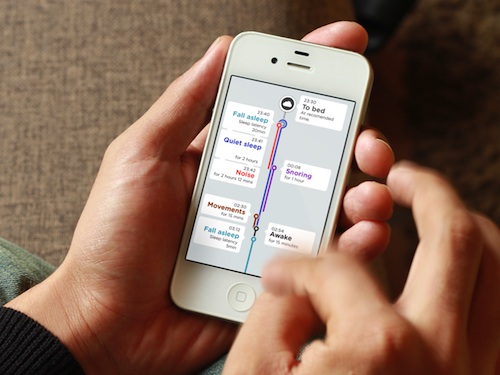 Saratoga, California-based Beddit, maker of sleep tracking equipment, launched an Indiegogo campaign for a consumer-priced sleep sensor. Through the campaign, consumers can pre-order the device with a 30 percent discount. So far Beddit has raised $5,000 of its $80,000 goal.
Saratoga, California-based Beddit, maker of sleep tracking equipment, launched an Indiegogo campaign for a consumer-priced sleep sensor. Through the campaign, consumers can pre-order the device with a 30 percent discount. So far Beddit has raised $5,000 of its $80,000 goal.
While Beddit has been making sleep trackers since 2006, this is their first consumer play: their other sleep trackers are made for organizations, personal trainers and physical therapy. The sensors are embedded on a strap that attaches to the user's bed for both the professional and consumer systems. The professional line requires an additional device that sits at the user's bedside and analyzes and then uploads the information to an online portal. In the consumer version, users check their sleep information from a companion app.
The strap uses ballistocardiography (BCG), a method which uses motion sensing to detect individual heartbeats from cardiac contraction forces and breathing rhythm from chest wall movements. The strap measures bed time, awakenings and bed exits, sleep time, sleep latency (the time it takes to fall asleep), testing heart rate, sleep quality and breathing movements, which also analyzes if the user is snoring. From there the strap uses Bluetooth to connect with the companion app, which offers personalized coaching, a wellness diary, a history of sleep recordings and a social sharing option.
Bam Labs, also founded in 2006, makes a similar sleep tracker although instead of a strap, like Beddit uses, Bam Labs puts the technology in a mattress pad. While it also tracks heart rate, breathing, and movement during sleep, Bam Labs says it can even diagnose sleep apnea.
There are many standalone apps focused on tracking sleep. Accelerometers embedded in devices such as Jawbone UP and Fitbit Flex have basic sleep tracking capabilities too. With the prototypes of Google Glass on the market, more attention has been focused on health sensors that users wear on their heads, some of which track sleep, like Zeo used to do.
In June, a crowdfunding campaign for Los Angeles-based Melon successfully raised money for its EEG headband with built-in audio neurofeedback and Bluetooth connectivity. While Melon is primarily marketed as a tool to track focus and concentration, co-founder Arye Barnehama told MobiHealthNews at the time that sleep was also an option for tracking.
“Sleep is one example,” he said. “Sleep is often measured using EEG and other companies have tried that — like Zeo which was not able to continue — so sleep is an area that developers are really excited to work on using the Melon platform.”
Barnehama says Melon is designed to be comfortable and “you definitely can sleep with it on," but admits that sleep is “such a difficult thing to integrate a device into” and that might be why the company itself isn’t pursuing it.




















